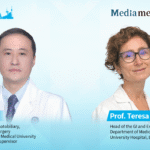
Insights from the 2025 Pujiang Prostate Cancer Congress
Editor’s Note: The 2025 Pujiang Prostate Cancer Academic Congress was held from June 27–28 in Shanghai, in collaboration with the Annual Meeting of the CSCO Prostate Cancer Committee (CSCO-PC), the Prostate Cancer Conference of the CACA Genitourinary Oncology Committee (CACA-GO), and the Chinese Prostate Cancer Consortium (CPCC) Annual Meeting. Centered around the theme “Global Wisdom, Chinese Practice, Precision Breakthroughs,” the event brought together leading experts to discuss cutting-edge progress and clinical insights in prostate cancer care. In an exclusive interview with Oncology Frontier – Urology Frontier, Professor Xiaojian Qin of Fudan University Shanghai Cancer Center shared his views on how the guiding philosophy in prostate cancer treatment is evolving.01
Oncology Frontier – Urology Frontier: In recent years, medical technology has progressed rapidly. From your perspective, how has the overall goal of prostate cancer treatment evolved?
Professor Xiaojian Qin: The core goals of prostate cancer treatment haven’t fundamentally changed—we are still focused on prolonging survival and improving quality of life. What has changed, however, is how we pursue those goals. I would summarize the shift as striving to help patients “live more simply.”
Extending life remains our top priority, but improving quality of life has become an equally important pursuit. With advances in therapies and treatment models, we now have the opportunity to simplify treatment—whether through less invasive procedures or reduced reliance on complex medication regimens—improving both patient compliance and overall treatment convenience.
Additionally, from the perspective of comprehensive disease management, increasing investment in healthcare infrastructure means patients no longer need to travel to multiple hospitals. A multidisciplinary team (MDT) within a single center can now deliver full-cycle care—from prevention, early detection and diagnosis, to standardized treatment, rehabilitation, and supportive care. This coordinated model allows both patients and their families to navigate the entire journey with greater ease and confidence.
02
Oncology Frontier – Urology Frontier: Do treatment goals differ across stages of prostate cancer? How do you tailor treatment goals to individual patients?
Professor Xiaojian Qin: Yes, treatment goals differ significantly depending on the stage of the disease. For patients with localized early-stage prostate cancer, the primary goal is cure—complete eradication of the tumor. At the same time, we strive to preserve critical anatomical structures and functions to help patients return to normal life as soon as possible after treatment.
For patients with advanced metastatic prostate cancer, where a cure is not yet achievable, our goal shifts to prolonging survival while maximizing quality of life. Treatment strategies should also be simplified to avoid the scenario of “living longer but suffering longer.”
Therefore, for early-stage patients, treatment emphasizes cure and functional preservation, followed by long-term monitoring through regular check-ups. For advanced-stage patients, a more specialized, multidisciplinary approach is needed—one that helps them go further, live better, and do so with less burden.
03
Oncology Frontier – Urology Frontier: With the rise of precision medicine and multidisciplinary collaboration, long-term survival with disease has become achievable for some late-stage prostate cancer patients. How do you balance the goals of prolonging survival and maintaining quality of life?
Professor Xiaojian Qin: This is a delicate balance. Extending survival is usually the top priority in cancer care. However, when this comes at the cost of a patient’s quality of life, we must reassess our approach. As some have said, “A moment of brilliance is better than a lifetime of mediocrity.” But for many patients and their families, the more rational choice is still to live as long as possible—with dignity and comfort.
As clinicians, we must still prioritize overall survival. Yet we must also recognize the reality that late-stage disease is often incurable. Therefore, we must focus on precision medicine: using the right drug for the right patient at the right time. This includes not only controlling the disease but also minimizing treatment-related toxicity. For instance, managing complications such as bone metastases or cancer-related pain through bone-targeted therapies and analgesics can help stabilize the patient’s condition and preserve energy for subsequent treatments.
Precision medicine and multidisciplinary care enable us to create simplified and effective treatment plans that both prolong survival and enhance quality of life—allowing patients to live not only longer, but also more simply and more fully.



